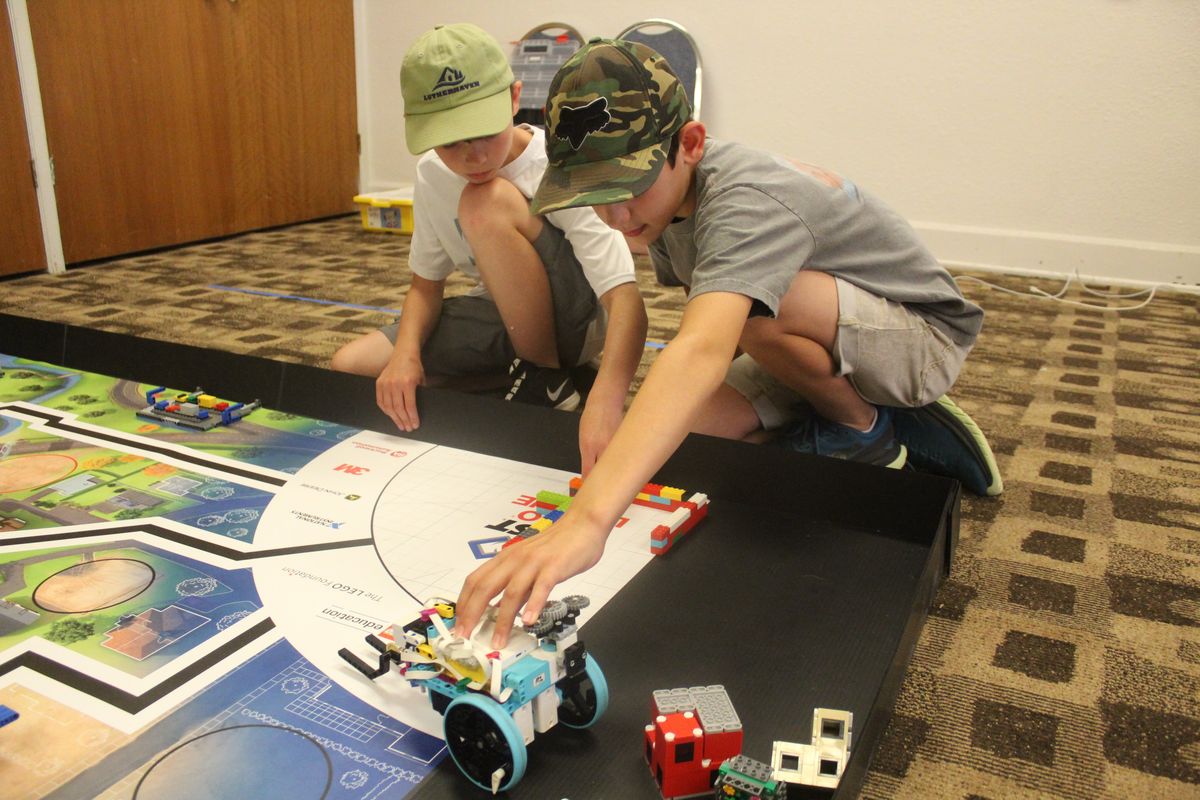Local lego competition camp

During the last two weeks of July, Westminster Congregational Church in downtown Spokane played host to a different type of congregation: campers at the Discovery Group Robots Lego summer camp. Every weekday for two weeks, local elementary and middle-schoolers came together to build and program Lego robots.
They might not be the traditional red bricks and bits, but these Lego robots (the Spike Prime and EV3 product lines) take the educational and creative possibilities of the popular toy to a different level.
“Lego is a really great educational tool,” said Lorna Kropp, a retired teacher who co-runs the Lego camp with teacher Molly Zammit. “The reason that we do this is to provide an opportunity to be creative and solve problems.”
The camp is divided into two groups: the builders (lower elementary school) and the engineers (upper elementary and middle school).
The younger group spent last week focused on basic elements of engineering: wheels, axels, pulleys, and more. They designed and constructed these mechanisms, iterating on the ideas that didn’t quite work until they arrived at functioning structures, often colorfully decorated.
Their collection included machines built to artfully crinkle paper. The project taught the young builders how to work with gears.
“It starts slow, and lots of teaching, but the biggest thing they do is teamwork and brainstorming ideas,” said Seth Griffith, one of the camp’s counselors for the builders group.
Even though the iconic toy is often sold with an instruction manual, no such thing can be found at the camp. According to counselor Maddy Brown, the most important factor in coaching the younger campers is giving them “the ability to be creative, and doing it their own way.”
For the older group – the engineers – that creative freedom is put to the test in a mock competition. The engineers work in pairs to solve increasingly complex challenges, which earn them points.
“They have to figure out wheel rotations, degrees, measurements of the (competition) board itself for whatever they’re doing,” explained Zammit.
“They learn that it doesn’t always happen immediately, that they have to keep going and tweaking and persevering.”
The engineers’ camp curriculum is based on First Lego League, a Lego robotics competition that runs throughout the fall. “It’s a sport for the mind,” said Kropp.
The campers solve robotics challenges and hone their problem-solving skills throughout the summer. For some, it is a fun new activity to try, and for others, it is practice for the fall competitions. FLL had over 300,000 participants globally before the pandemic slowed the program.
During the fall, Kropp and Zammit run a neighborhood FLL team with kids from local schools around the area.
“It’s to recognize kids that want a challenge in a more mental aspect,” said engineers camp counselor Adalgisa De Caro.
It’s not all about the competition, though. The first thing that Zammit pointed out upon entering the work room was their word of the day: “coopertition,” a portmanteau of cooperation and competition.
The teams that make the most headway in their daily challenges are the ones that work best together, iterating as a collaborative duo.
“I like how they’re a challenge, I guess” said one of the most experienced engineers, Abby Short. “They’re nice, they’re fun to do and there’s multiple options so if you get frustrated you can just go to a different option.”
Short and her partner Eli Connelly demonstrated the coding procedures in the Lego EV3 software and some of their robot’s successful tasks. Their robot has various input sensors, motors, and custom fixtures that need to be controlled, so completing a task like going up and down a bridge is far from simple.
“It takes a lot of courage and it has a lot of frustration,” said Greyson Baker, who along with partner Gentry Hawk was in the midst of recovering lost programs for their Lego robot. “It’s very difficult but fun at the same time.”
De Caro described the experience of coaching the young engineers similarly, as requiring, “someone that allows them to make mistakes rather than just doing it for them. It’s hard to do, but it helps them a lot more.”
After the end of a lengthy mock-competition, the engineers group circled to break down what had happened. Each camper shared a success and a challenge they faced: Robots had broken, programs were lost and found, bridges climbed, drones picked up and delivered. It was a busy day at Lego camp.